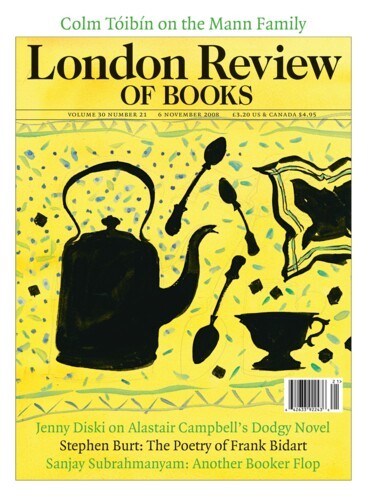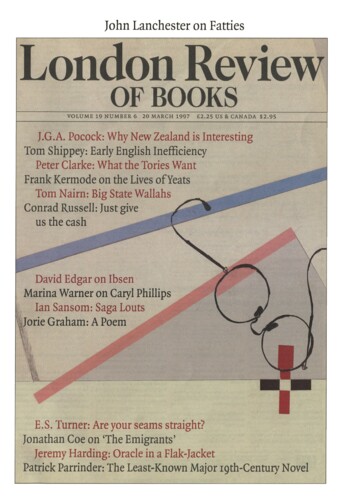J.G.A. Pocock
J.G.A. Pocock, who died in 2023 at the age of 99, taught for many years at Johns Hopkins. He was the author of The Ancient Constitution and the Feudal Law, The Machiavellian Moment: Florentine Political Thought and the Atlantic Republican Tradition, the six volumes of Barbarism and Religion, concerning Edward Gibbon’s Decline and Fall of the Roman Empire, and many other books about the history of political thought and about history as a kind of political thought. He wrote for the LRB on subjects including Edward Gibbon, Edmund Burke and Aotearoa New Zealand, where he grew up.
Rangatiratanga: Maori
J.G.A. Pocock, 8 September 2011
To explain why Judith Binney – who died in New Zealand in February – is a major figure in contemporary historiography it is necessary to explain why the history of her country has become a field of which contemporary historians do well to take notice. They have not always done so. New Zealand has been considered a safe, dull Anglo-democracy, with a welfare state 75 years old and...
‘Kawanatanga’
6 November 2008
The Ironist: Gibbon under Fire
J.G.A. Pocock, 14 November 2002
Since two pioneering studies appeared in 1954, Arnaldo Momigliano’s ‘Gibbon’s Contribution to Historical Method’, and Giuseppe Giarrizzo’s Edward Gibbon e la cultura europea del Settecento, the historian of the Roman Empire has himself become the object of serious historical study. It can still be maintained that his work is, in D.R. Woolf’s words,...
Removal from the Wings
J.G.A. Pocock, 20 March 1997
For a people accustomed to govern itself, history is the past of its sovereignty, modified by such other pasts as appear relevant. What is such a people to do when the historical conditions which have defined its sovereignty are radically changed, and the future of sovereignty itself appears uncertain? A possible answer is that it may set about rewriting its history in the light of these new questions, emphasising the precariousness of its historical autonomy, and asking whether sovereignty has in fact been exercised and if so, by whom. Since autonomy is in question, it may even ask whether it has been one people or several. The uncertainties of the present stimulate enquiry into the past, and the outcome may vary between an angry nationalism, a whining defeatism, or a recognition that as autonomy, sovereignty and history become precarious, their value can be re-assessed or re-asserted; the texture of thought toughens as the questions grow more difficult.
Pieces about J.G.A. Pocock in the LRB
Europe, what Europe? J.G.A. Pocock
Colin Kidd, 6 November 2008
Few areas of the humanities have undergone such a remarkable transformation over the past half-century as the history of political thought. Students were once introduced to it by way of its...
Writing the History of Middle Earth: Edward Gibbon
Colin Kidd, 6 July 2000
Tall, silver-haired and bearded, with a mesmerising voice and beguiling manner of delivery, John Pocock has long struck me as the Gandalf of the historical profession. The range, altitude and...
No Trousers
Claude Rawson, 20 December 1990
Burke’s Reflections on the Revolution in France was published on 1 November 1790. By then, Burke had long ceased to be the dominant intellectual influence in the Whig Party. He hoped the...
Tory History
Alan Ryan, 23 January 1986
Demolish a much-loved building, and you are left with rubble. Demolish a much-loved piece of political theory, and you find it rising from its own ashes, somewhat changed in appearance, but...
Writing to rule
Claude Rawson, 18 September 1980
Was there such a thing as ‘Neo-Classicism’, outside the special sense of the term which art historians apply to a later period than the one over which students of literature lose so...
Read anywhere with the London Review of Books app, available now from the App Store for Apple devices, Google Play for Android devices and Amazon for your Kindle Fire.
Sign up to our newsletter
For highlights from the latest issue, our archive and the blog, as well as news, events and exclusive promotions.




